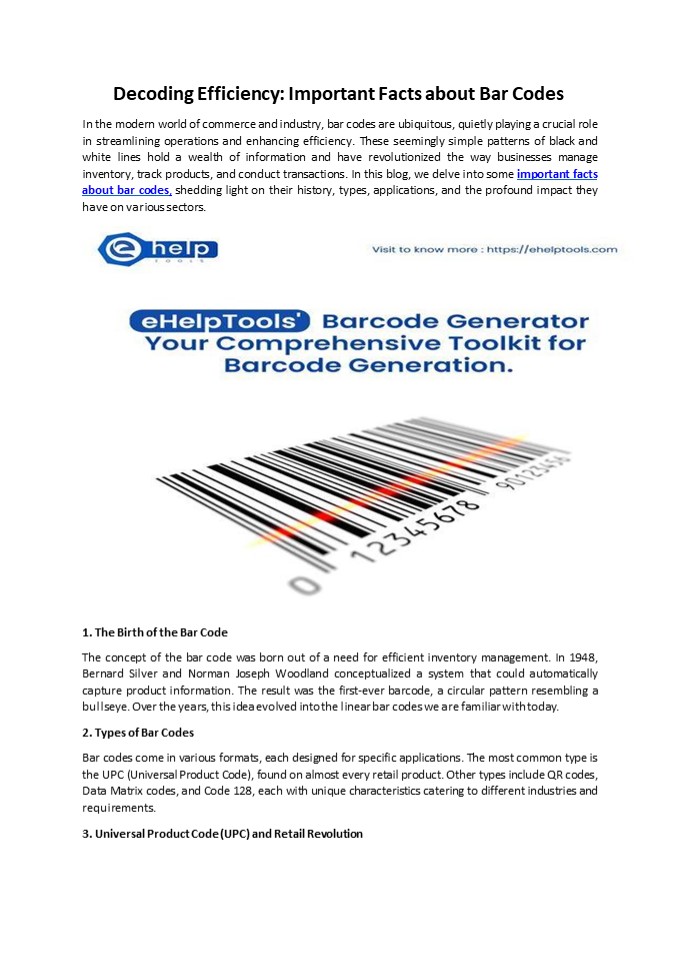Decoding Efficiency: Important Facts about Bar Codes - PowerPoint PPT Presentation
Title:
Decoding Efficiency: Important Facts about Bar Codes
Description:
Explore the pivotal realm of Decoding Efficiency with 'Important Facts about Bar Codes.' Uncover the intricate web of technology behind bar codes, deciphering their role in streamlined data retrieval. This succinct guide illuminates the nuances of decoding mechanisms, shedding light on how bar codes enhance efficiency across industries, revolutionizing inventory management and facilitating seamless transactions. – PowerPoint PPT presentation
Number of Views:1
Title: Decoding Efficiency: Important Facts about Bar Codes
1
Decoding Efficiency Important Facts about Bar
Codes In the modern world of commerce and
industry, bar codes are ubiquitous, quietly
playing a crucial role in streamlining operations
and enhancing efficiency. These seemingly simple
patterns of black and white lines hold a wealth
of information and have revolutionized the way
businesses manage inventory, track products, and
conduct transactions. In this blog, we delve into
some important facts about bar codes, shedding
light on their history, types, applications, and
the profound impact they have on various sectors.
- The Birth of the Bar Code
- The concept of the bar code was born out of a
need for efficient inventory management. In 1948,
Bernard Silver and Norman Joseph Woodland
conceptualized a system that could automatically
capture product information. The result was the
first-ever barcode, a circular pattern resembling
a bullseye. Over the years, this idea evolved
into the linear bar codes we are familiar with
today. - Types of Bar Codes
- Bar codes come in various formats, each designed
for specific applications. The most common type
is the UPC (Universal Product Code), found on
almost every retail product. Other types include
QR codes, Data Matrix codes, and Code 128, each
with unique characteristics catering to different
industries and requirements. - Universal Product Code (UPC) and Retail Revolution
2
- The UPC, introduced in 1974, revolutionized the
retail industry. With a standardized system of
product identification, retailers could automate
their inventory processes, reduce errors, and
speed up the checkout process. This ushered in a
new era of efficiency in the retail supply chain,
benefiting both businesses and consumers. - QR Codes Beyond the Basics
- While traditional bar codes store limited
information, Quick Response (QR) codes have taken
data storage to the next level. Developed in 1994
by Denso Wave, a subsidiary of Toyota, QR codes
can store not only numeric and alphanumeric
characters but also images and URLs. This
versatility has made QR codes invaluable in
marketing, allowing businesses to link physical
products to a wealth of digital content. - Bar Codes in Healthcare
- The healthcare industry has also embraced bar
codes to enhance patient safety and streamline
operations. Bar codes are used to label
medications, wristbands, and patient records.
Scanning these bar codes ensures accurate
administration of medications, reduces errors,
and improves overall patient care. - Logistics and Supply Chain Efficiency
- In the realm of logistics and supply chain
management, bar codes play a pivotal role in
tracking and tracing products. Bar-coded labels
on packages enable seamless tracking from
manufacturing to distribution, reducing the
likelihood of errors and improving overall supply
chain efficiency. This is particularly crucial in
industries where timely and accurate delivery is
paramount. - Enhanced Data Accuracy
- One of the primary benefits of bar codes is the
elimination of manual data entry errors. Scanning
a bar code significantly reduces the risk of
human error associated with manual data input,
ensuring that accurate information is captured
and recorded. This has a cascading effect on
various aspects of business, from inventory
management to order processing. - Bar Codes and Mobile Technology
- The advent of mobile technology has further
amplified the utility of bar codes. With the
prevalence of smartphones equipped with cameras,
individuals can now scan bar codes on the go.
This has led to innovative applications, such as
mobile ticketing, contactless payments, and
interactive marketing campaigns that seamlessly
bridge the physical and digital worlds. - Environmental Impact of Bar Codes
- Contrary to the perception that bar codes
contribute to waste, they can actually aid in
sustainability efforts. Bar codes help optimize
inventory management, reducing overstocking and
minimizing waste. Additionally, the shift towards
digital receipts and mobile-based loyalty
programs, facilitated by bar codes, contributes
to a reduction in paper usage. - Ongoing Innovation in Bar Code Technology
- The world of bar codes is not static. Continuous
innovation is underway to enhance their
capabilities. From 2D bar codes capable of
storing more information to advancements in
scanning technology, the evolution of bar codes
continues to shape the future of data capture and
information management.
3
Read more Simplify Your Work with a Free Barcode
Generator In conclusion, bar codes are not just a
series of lines they represent a powerful tool
that has transformed industries and streamlined
processes. From their humble beginnings as a
solution for inventory management to their
current role in facilitating contactless
transactions and enhancing supply chain
visibility, bar codes continue to be an integral
part of our daily lives. As technology evolves,
so too will the capabilities of bar codes,
ensuring their relevance and importance in the
digital age. Decoding efficiency, one bar code at
a time. Ehelp Tools presents a streamlined
Barcode Generator, empowering users to
effortlessly create custom barcodes for products,
inventory, and more. With a user-friendly
interface, this online tool offers a quick and
efficient solution for businesses seeking
accurate and professional barcode generation.
Simplify your inventory management and product
labeling processes with Ehelp Tools' Barcode
Generator. Source https//writeupcafe.com/decodin
g-efficiency-important-facts-about-bar-codes/































